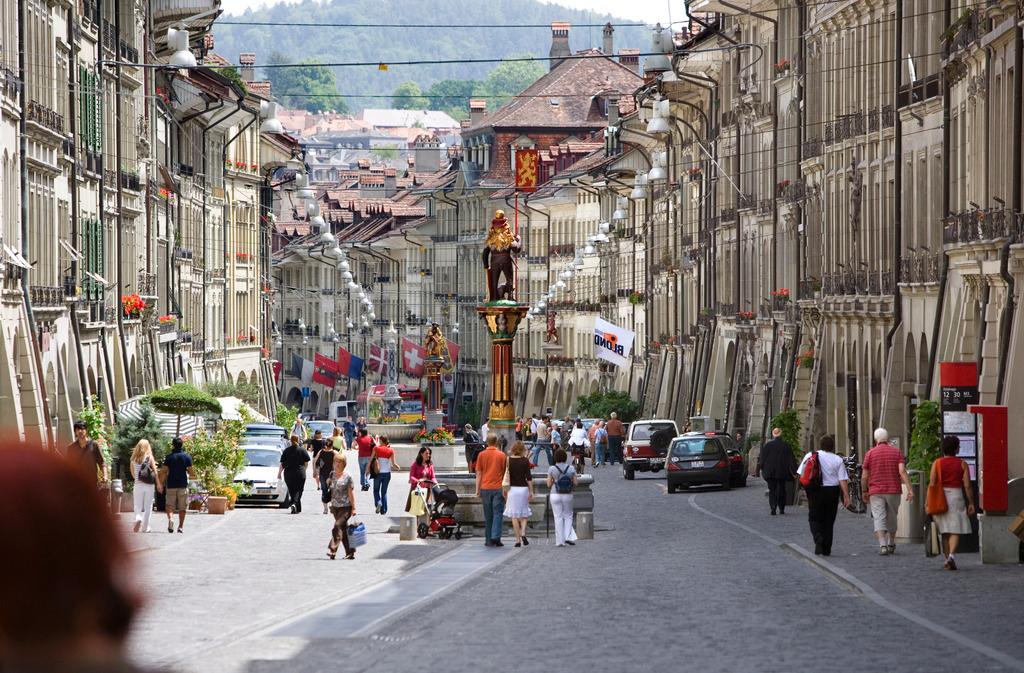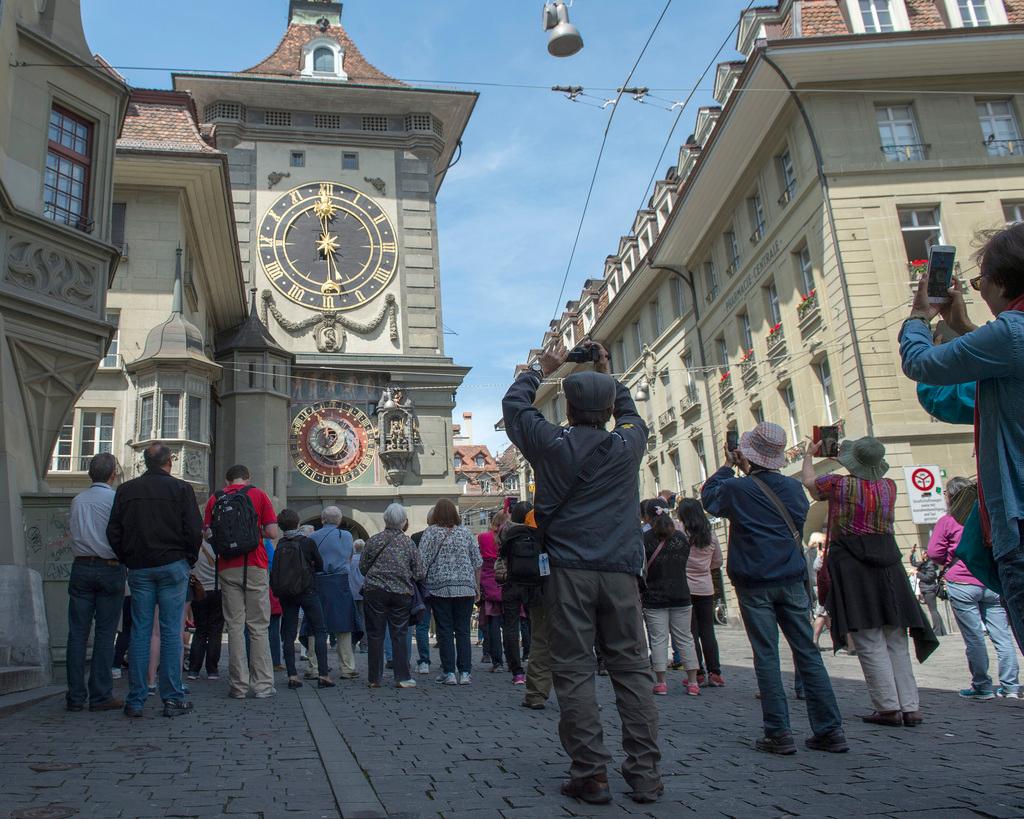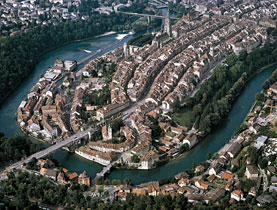Bern shopkeepers fight tourism tax

A new tourism tax to be levied on shopkeepers in Bern could tarnish the charm of the UNESCO World Heritage town instead of helping preserve its medieval character.
With its colourful fountains, terracotta rooftops, cobblestoned streets and limestone arcades, Bern is a magnet for visitors and a World Cultural Heritage Site. According to city conservationist Jean-Daniel Gross, the significance of the UNESCO label has risen since Bern received it in 1983.
“In the beginning there was almost no importance; now the label is known all over the world and its prestige has become more important every year,” Gross told swissinfo.ch.
Bern Tourism’s Nicole Schaffner agrees that the UNESCO label is probably the most important selling point for the old town of Bern. “It’s crucial for our marketing activities, especially in Asia and America.”
Bern depends on these visitors for the money they leave behind, but how can they keep them coming – and spending – without having a negative impact on the town’s heritage?
According to Schaffner, a new tourism tax should boost the marketing budget to help Bern attract more hotel guests – who tend to spend more money in local shops and restaurants than their day-tripping colleagues. [See box at end for details of the proposed tax.]
Hard times
Shopkeepers are wary of the tax. They worry that the marketing campaigns target the “wrong” type of visitors: package tourists who wander around in droves but seldom stop to buy anything before hopping on the bus to the next Swiss town.
Antony Adams runs the novelty shop CMX on Rathausgasse, which carries designer housewares, radios, toys and other fun items. According to Adams, few tourists find their way into his shop, which is parallel to the main drag.
“When you have mass tourists, they benefit almost nobody. They just march up from the bear park to the Zytglogge [clock tower] and back again, taking photographs. Even the businesses along that street benefit very little,” Adams says.
Heimatwerk, located on Kramgasse, is another example. It specialises in Swiss products like wood carvings, writing instruments, textiles and glassware. It would seem like a perfect match for foreign shoppers, but there weren’t many there when swissinfo.ch visited.
“The groups from the Zytglogge don’t really come into our shop,” manager Ruth Lundquist told swissinfo.ch. Like Adams, she’s against the tax.
“Most of the stores around here are really small. I don’t think it’s a good idea to tax us, because we already have a hard enough time just to stay open,” Lundquist said.
‘Kramgasse 2020’
A recent University of Bern survey took the pulse of proprietors on Kramgasse, the main street in Bern’s old town. Some findings:
- 30% say business has declined since 2000.
- 35% say there’s been a major decline in customers.
- 36% are thinking of moving or closing on account of high rents.
- 62% are willing to cooperate with other businesses.
The study concluded that tourism was a double-edged sword for old town businesses. On the one hand it could mean new business, on the other, it could lead to an “overrun” feel to that area.
Endangered charm?
While major retailers and international chain stores can generally count on more solid financial foundations, the small, independent businesses are more vulnerable.
“The risk is definitely there. But I think the Bernese people are aware of it. First of all, the real core bit of UNESCO world heritage is the lower part of the old town, and that area isn’t as attractive for big labels. They would rather stay in the upper part of town,” retired University of Bern tourism professor Hansruedi Müller told swissinfo.ch. He was the person tasked with developing the model for the tourism tax.
University of Bern researcher Jeantine Viebrock feels businesses will have to adapt to stay afloat. She took a survey – and the pulse – of the businesses in the heart of the old town.
“Owner-managed businesses face the threat of ongoing structural change, like new shopping malls, internet trade and changes in consumer behaviour. To survive they need to be innovative and adapt to the needs of consumers,” Viebrock told swissinfo.ch.
So could the old town’s current array of sidewalk cafés and antique and artisan boutiques give way to generic souvenir shops stuffed with plush bears, cheap watches and army knives?
As Viebrock points out, the correspondingly high prices for housing attract the kind of tenants who appreciate the old town as it is, including the current retail mix.
“These residents often support the charms of the lower old town by maintaining the old houses and lanes. Such ‘idealists’ bring added value to the lower old town, also in terms of preserving the UNESCO World Cultural Heritage Site,” Viebrock said. They are more likely to support local businesses, too.
But Müller believes tourists do their part as well, explaining that an old town attraction like Bern’s bear park is key because it encourages tourists to walk the whole route, and many will make at least a small purchase – even if some would dispute that.

‘It’s expensive here’
“No, we’re not shopping. We’re just sightseeing,” said a pair of Chinese women standing in front of Bern’s Zytglogge clock tower one summer afternoon. They were among the crowd of visitors who had gathered for the hourly spectacle of the crowing cock and the dancing bears.
A teenage girl from the Netherlands shyly admitted to buying some underwear when asked what was in her little bag.
“But it’s expensive here. I don’t think we’ll buy much else,” she said; her friend agreed.
Nearby, a Canadian man was carrying a tote from a souvenir boutique. He had treated himself to a moderately-priced Swiss watch, but his wife had yet to pick up a memento from Switzerland – except for postcards and a “CH” sticker for her car.
A few other people in the clock-watching bunch were holding small parcels from sweet shops, but otherwise, hardly anybody had a shopping bag.
The exception was a family with two young children. Both parents were laden with bags – mainly clothing, but also a Lego set.
“We like shopping in Bern. There’s also a ballet shop nearby – we’ll go there next because our daughter takes dance lessons,” they said. It turns out that they were from the neighbouring canton of Solothurn, less than an hour from Bern by train.
Next steps
“Lots of villages and tourist destinations have a [tax] system like [the one being proposed]. What is new is that the cities are also trying to apply this kind of system. That means not only collecting a tax from tourists when they stay in a hotel, but also from those who profit from tourism,” Müller explained.
Asked how fairness was ensured, Müller said, “The only ones taxed would be those dependent on tourism.” Shops, for example, with tourism accounting for less than 5% of their turnover wouldn’t have to pay. Müller says that exempts more than half of all businesses in the city.
Geneva already has such a system in place, which has given Bern a chance to observe how that’s working. According to Müller, the tax system as it’s applied in Geneva works.
Having been approved by the Bern city government in April, the proposal will be discussed by the local parliament in September. After that it could be put to a popular vote.
The proposed tourism tax
The proposed tax is based on location, type of business and number of employees. For example, the city centre and old town would have the highest base rate as they presumably get the most visitors.
The type of business is also a factor, meaning that a bank or a clothing store would pay more than a supermarket, museum or florist. Businesses employing only one person full time would be exempt.
Shops like CMX and Heimatwerk would pay CHF400-800, depending on whether they were classified under “souvenirs” or “household supplies”. On the other end of the spectrum – and located in the more globalised “high street” end of Bern’s shopping mile – Swiss department stores Globus and Loeb would have to pay CHF18,000 per year, even though these stores say the tax is unfair since tourists are not targeted customers.
Loeb spokeswoman Nicole Studer questions the value of the tax:
“What will retailers get in exchange if they pay this fee to help boost Bern as a tourist destination? In particular, we’re thinking of longer opening times, including more Sundays, like in other tourist destinations.”
“It’s also unclear how the additional revenue will be invested. The promotional activities would have to benefit all the businesses that contribute.”
Alternative city guide
Some 100 businesses have joined forces to launch a city guide covering the side streets on either side of Kramgasse. CMX shop owner Antony Adams initiated the project. In addition to the German-language print guide, a corresponding websiteExternal link will soon offer the information in English and French.

In compliance with the JTI standards
More: SWI swissinfo.ch certified by the Journalism Trust Initiative













You can find an overview of ongoing debates with our journalists here . Please join us!
If you want to start a conversation about a topic raised in this article or want to report factual errors, email us at english@swissinfo.ch.